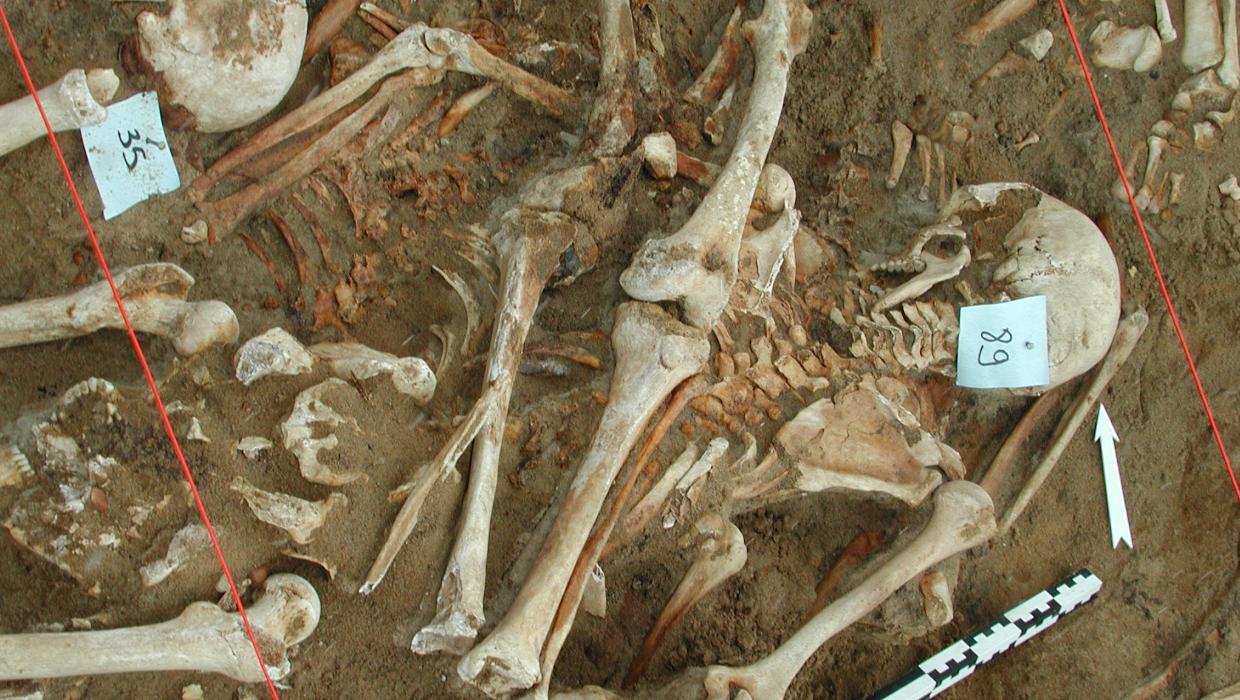Politics
Napoleon’s Army’s Downfall Revealed Through Soldiers’ Teeth

New research has uncovered critical insights into the demise of Napoleon Bonaparte’s army during its ill-fated invasion of Russia in 1812. An analysis of the teeth of deceased soldiers reveals that poor nutrition and harsh conditions significantly contributed to the catastrophic losses faced by the French forces.
In the summer of 1812, Napoleon led an army of approximately 600,000 troops into Russia, aiming to secure a decisive victory. However, the campaign quickly deteriorated due to a combination of logistical failures, extreme weather, and fierce resistance from Russian forces. By the end of the campaign, it is estimated that less than 100,000 soldiers returned to France.
Dental Insights into Historical Failures
A recent archaeological study conducted by researchers from the University of Cambridge examined the remains of soldiers from this infamous campaign. The findings, published in a leading historical journal, highlighted that the dental health of these soldiers was severely compromised.
The study revealed that many soldiers suffered from tooth decay and other dental diseases, indicating a diet lacking in essential nutrients. This poor nutrition, combined with the physical strain of the campaign, contributed to their inability to withstand the rigors of the harsh Russian winter. The evidence suggests that the army’s logistical issues extended beyond just supply lines; they included inadequate provisions for maintaining soldiers’ health.
The researchers utilized advanced dental analysis techniques to assess the bones and teeth of the soldiers. Their findings indicate that the soldiers’ diet primarily consisted of bread and salted meat, which lacked vital vitamins and minerals. This nutritional deficiency likely weakened their overall health, making them more susceptible to illness and fatigue during the campaign.
The Broader Implications of Poor Logistics
The study not only sheds light on the circumstances surrounding Napoleon’s invasion but also emphasizes the importance of logistics in military campaigns. While the tactical decisions made by Napoleon are often scrutinized, this new evidence indicates that the failure to ensure proper nutrition was a significant factor in the army’s collapse.
Additionally, this research provides a deeper understanding of the human cost of war. The soldiers who fought under Napoleon were not just numbers lost in battle; they were individuals who suffered from preventable health issues exacerbated by their circumstances. The insights gained from their remains serve as a stark reminder of the impact of military decisions on human lives.
The findings from the University of Cambridge study contribute to a growing body of research that seeks to understand the complexities of historical military failures. By examining the physical remnants of past conflicts, historians can uncover the multifaceted reasons behind these events.
In conclusion, the examination of soldiers’ teeth from Napoleon’s ill-fated Russian campaign has provided valuable insights into the nutritional shortcomings that contributed to the army’s devastating losses. As historical research continues to evolve, it remains crucial to recognize the interplay between logistics, health, and military strategy in understanding the past.
-

 Sports2 months ago
Sports2 months agoNetball New Zealand Stands Down Dame Noeline Taurua for Series
-

 Entertainment1 month ago
Entertainment1 month agoTributes Pour In for Lachlan Rofe, Reality Star, Dead at 47
-

 Entertainment2 weeks ago
Entertainment2 weeks agoNew ‘Maverick’ Chaser Joins Beat the Chasers Season Finale
-

 Sports1 month ago
Sports1 month agoSilver Ferns Legend Laura Langman Criticizes Team’s Attitude
-

 Politics3 weeks ago
Politics3 weeks agoNetball NZ Calls for Respect Amid Dame Taurua’s Standoff
-

 Entertainment2 months ago
Entertainment2 months agoKhloe Kardashian Embraces Innovative Stem Cell Therapy in Mexico
-

 World3 months ago
World3 months agoPolice Arrest Multiple Individuals During Funeral for Zain Taikato-Fox
-

 Sports2 months ago
Sports2 months agoGaël Monfils Set to Defend ASB Classic Title in January 2026
-

 Entertainment4 weeks ago
Entertainment4 weeks agoTyson Fury’s Daughter Venezuela Gets Engaged at Birthday Bash
-

 Sports4 weeks ago
Sports4 weeks agoHeather McMahan Steps Down as Ryder Cup Host After Controversy
-

 Entertainment4 weeks ago
Entertainment4 weeks agoTyson Fury’s Daughter Venezuela Gets Engaged at Birthday Bash
-

 World3 weeks ago
World3 weeks agoNew Zealand Firefighters Plan Strike on October 17 Over Pay Disputes





















